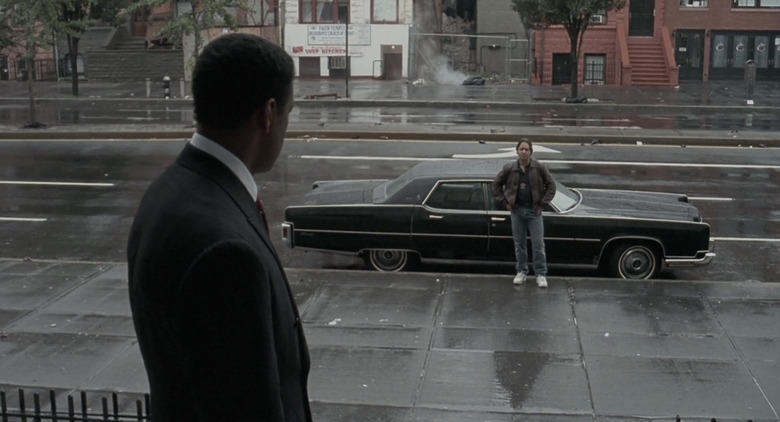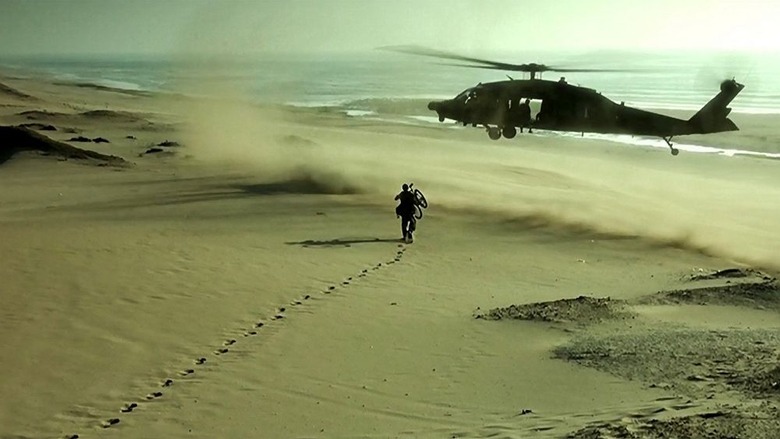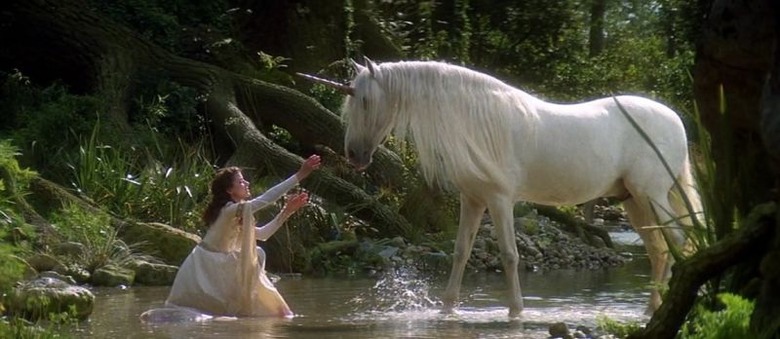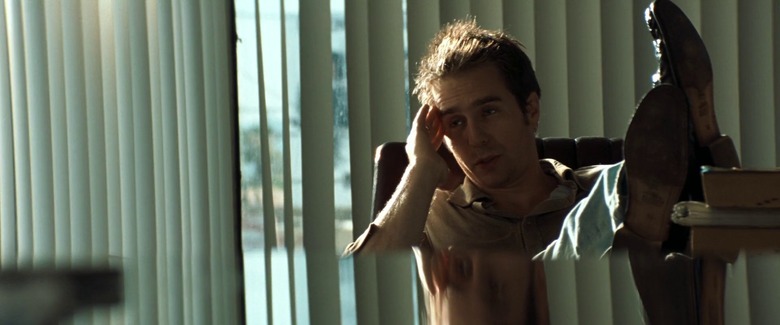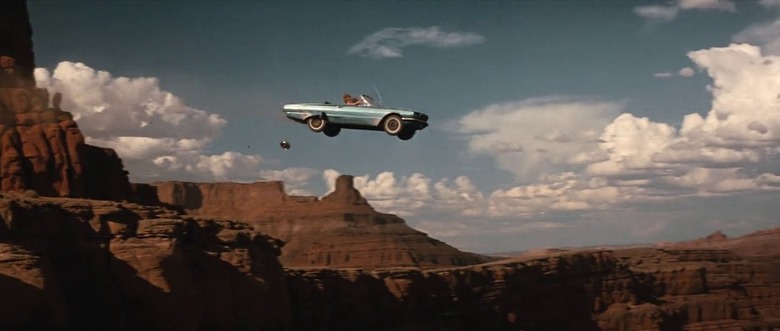Five Great Ridley Scott Audio Commentaries
In 1965, Sir Ridley Scott made his directorial debut with the short film, Boy and Bicycle. His illustrious filmmaking career began with a short that cost him $120 and starred his brother, the late Tony Scott. It led to a career that is nothing short of spectacular, one never lacking passion or permanence. He's a filmmaker who's been ahead of the curve, created trends, and made movies that'll last forever.
Thankfully, he's been game to talk about almost every one of his films in audio commentaries. He's always candid, ready to share his wealth of knowledge, and keep you hanging onto his every word, whether it's for a two-hour drama or one of his three-hour epics. The master filmmaker is, without question, a master of audio commentaries.
With the recent release of Alien: Covenant, it felt like the right time to listen to some of Scott's commentaries. His tracks for Alien and Blade Runner are must-listens, and the same goes for his tracks about demons, kingpins, two legends on the road, and con artists. Here are the five you really need to seek out.
American Gangster (Featuring Ridley Scott and Steve Zaillian)
Why Listen: Two and a half hours that go by like a breeze. When it comes to crafting a period piece, Scott is every bit as meticulous as he is when it comes to visualizing the future, which isn't the least bit surprising. You leave the American Gangster commentary knowing a decent amount about Frank Lucas, how he worked, and the world of the heroin trade. If this subject and time period interests you, you'll be enthralled by this track, even if you're not a fan of the movie. Part history lesson and part filmmaking lesson, it's another entertaining and lengthy Scott commentary that never runs out of gas or words of wisdom. Zaillian's presence, of course, is equally compelling. The screenwriter opens up about his process, but he also provides insights into the way Scott works maybe only an outsider could see or comment on.What's Said: Scott studied design for seven years, worked for the BBC, and shot thousands of commercials. Because of that, his first feature, The Duellists, was a smooth experience. Long after his debut movie came out, though, he still believes all that work doesn't matter some days:
3,000 commercials, 40 years in the business, and this is my 19th feature film. Everything that you did just prior to this is not as important as what you're going to do today. That's something you have to remember. That's probably the most significant thing I've said on the tape [chuckles]. Everything you've done is no longer relevant; it's what you get when you get there. What is relevant is what you're carrying with you, which is your experience. Your experience will give you that probable confidence to push something, this way or that way, or recognize when it's happening and agree.
A Day on the Job: Scott's least favorite part of the job, which is made crystal clear throughout his commentaries, is his general distaste for test screenings. On the day American Gangster was tested, he was happy to stay out of the theater:
This tested really, really well. I was surprised by how well it tested. This tested, like, Shrek level with audiences research. This tested at 92 or 94. Normally, that's attributed to animation films for kids. I don't like testing. I hate it, hate it. It's the part of pictures I hate. Actually, I was kind of nervous about this and wasn't going to go. Screw it. Nothing I can do now is going to make any difference. I know Steven has always said he hates testing; he'll never go to a test. I think I'm a negative force sitting in the back of the theater, where what I'm feeling is welling up and affecting the audience negatively. Instead I was going to go to a bar and just have a couple of drinks for a couple of hours and read about it the next day.
Trivia: After bringing down Frank Lucas, Ritchie Roberts only got three days vacation. No reward.
Black Hawk Down (Featuring Ridley Scott and Producer Jerry Bruckheimer)
Why Listen: "Anyone in their right mind making a film about war, I hope, is going to be a serious film about anti-war."
In the filmmaker's eyes, he was a making pro-military movie and an anti-war movie. It was a challenging and rewarding experience, one he references and reflects on in other tracks. He was using up to 11 cameras and faced the most obvious difficulties of directing large-scale war scenes. He did it all with a schedule shorter compared to other movies of this scope, but that's secondary to Scott's compassion for the soldiers and what transpired during the Battle of Mogadishu. The director's attention-to-detail is maybe most prevalent in this track.
What's Said: With science-fiction films, Scott's discussed the trouble of keeping actors in helmets. With Black Hawk Down, he was okay taking a departure from reality to make sure the audience knows who's who during the chaos:
It suddenly dawned on me as soon as these guys have crewcuts, the buzzcut, and put on the helmet, goggles, and chinstrap, they're starting to look the same. That became a big concern. In that moment, there's not a lot you can do about it, so you try to clarify as much as possible. I said, 'Well, let's put names on helmets, front and back.' They said, 'We don't do that.' I said, 'You did that in Vietnam. I saw it.' They said, 'Yeah, that was then, this is now.' My argument was, well, because this is even more guerilla, there is even more warfare, then there is even more reason to acknowledge and recognize your teammate. Also, from my point-of-view, I would've been shouting, 'Oy, you!' I would never get his name because I may not be able to recognize him. I think, little by little during the film and by the second act, you start to get who's who, which I think is fine. You don't need any more backstory. This is about the event then and that night. What else needs to be told? That's what the story is about.
A Day on the Job: A significant part of Black Hawk Down was shot at night, which isn't Scott or many other filmmakers' ideal time to shoot. For Black Hawk Down, the director and all involved came up with a solution so everybody wouldn't tire or lose momentum.
The problem about moviemaking is you gotta dramatize darkness to the point that, of course, the audience has to see. Otherwise, there's no point in watching the movie. You'd be watching radio. We do what we call 'movie darkness.' Shooting at night is never my favorite time. First of all, it's exhausting. At night, when it's usually dinner, everyone is filled with dinner at one-thirty in the morning, and you really get only 40% of everybody. They're fading away. Economically and creatively, it's a bad solution whichever way you look at it. On this, we split nights, where we'd only work up to 12 at night, and then start 12 o'clock the next day. You gradually work your way through that as oppose to investing your entire time, from six at night to six in the morning, which is absolutely a killer.
Trivia: When Ridley Scott first met Harrison Ford, the actor showed him how to make coffee. "It's all in the measure," Ford told him. "Don't guess. It's the measure of coffee against the measure of water." The meeting inspired Grime's (Ewan McGregor) coffee making skills.
Legend (Featuring Ridley Scott)
Why Listen: Scott, whose fantasy film was influenced by Jean Cocteau's Beauty and the Beast, and Disney's Snow White and the Seven Dwarves, and Fantasia, plants the listener right into Legend's beautiful sets, as he covers their influences, how they were constructed, and the effect he wanted them to achieve. He's still pleased with the movie, and while listening to him, it's impossible not to be just as impressed as he is and engrossed by its beauty. Each gorgeous image here tells us a story – which was originally bigger and a little more action-heavy. Legend is one of Scott's more tech-heavy conversations. He discusses the limitations, obstacles, and more when it comes to creating this stunning world without stars or the biggest budget.What's Said: During the Thelma & Louise commentary, Scott mentions how many reviews he's read asking (and criticizing), "Why so much steam?" He doesn't care about those criticisms as much as he used to. For him, it helps create energy:
When you're shooting a film, I'll cover the wides, but the wides, I rarely use. You need them occasionally. Scenes really tend to be built over medium shots and close-up shots. The real meat and potatoes of a scene usually end up being close-ups. It's always a constant battle on what you've built and what you want to see. For the most part, the story is told in medium and close-up. The trick is not to lose your visual narrative for the sake of a close-up all the time. I always try to get everything I can. I think that's what led me down a route, certainly on films like this and science-fiction...I use elements a lot. In Blade Runner, it was raining. In Alien, it was steam or extraneous sounds. I find sounds are like energy. Things in the air and filling the space on the screen is energy. That would be a way I could supplement the energy you've built up in the wider shots. When you come into the close-up, of course, hopefully, one is getting a wonderful performance and the energy is coming from the actor, but you still gotta sustain your visual narrative.
Day on Set: Scott believes CGI can not only sometimes undermine drama, but can also be a ridiculous waste of money:
Here we are back on the Bond stage for the fairy dance. The fairy dance used to go on much longer. What's interesting here is you see this thing here [the light], which should've been CGI, which doesn't exist [then]. This is a guy with a fishing rod with a light, dancing it away. Know what that would cost today? About $200,000. Know what it cost me? It cost me a fishing fight with a bit of fine hairline and a little lightbulb. Hello. So all you're doing every now and again in a while is screaming at the prop man for what a jerk he is for not making it look like tinker bell.
Trivia: Tim Curry would take Darkness' cloak home for the weekends.
Matchstick Men (Featuring Ridley Scott and screenwriters Nicholas Griffin and Ted Griffin)
Why Listen: This is easily the funniest commentary on the list. Scott has a sharp and subtle wit, but the screenwriters are hilarious. From their first encounter with Ridley to their on-set experiences, they have some great stories about meeting and collaborating with a filmmaker whose work they find awe-inspiring. Some of the memories they share are a reminder that Scott's visual storytelling wouldn't be as impactful if it wasn't for his sense of character.What's Said: Scott calls bull on anyone who says they see Matchstick Men's twist coming. He heard those criticisms from test screenings, and he wishes he was there to question them. His "elegant comedy" might've benefited from the experience in one regard, though:
I put in 12 clues. Unfortunately, by mentioning it, it was fatal. Half of these clues are just beats, so you get this funny feeling. What I didn't want to do is fool the audience, therefore make them furious they've been fooled so close to the end about characters they really love, like her (Alison Lohman) and Frank (Sam Rockwell). You think, 'God, he's a bad guy and taking from his friend,' so that is all the danger in being dangerously unsympathetic. I thought it'd be better to have the clues, so you can reflect on them at the end. 'Of course, of course, I missed all that.' Hopefully, as an audience member, you can laugh at yourself. When I was first testing this, one of the tricky things about the tests was I got a sense of irritation from the audience, mainly because they'd been conned. I thought it was better to remove all the clues.
A Day on the Job: One of the toughest scenes for the Griffin brothers to write was the final encounter between Roy Walter (Nicholas Cage) and Angela. What's the tone? How angry should Roy be? In the end, to Scott, he's more unhappy she really wasn't his daughter, which was an idea driving the scene. The Griffin brothers wanted them to "express something they cannot say explicitly," which they might not have gotten right the first time around, so the final scene was reshot:
We re-shot about two minutes of the scene with some of the dialogue adjusted and some new elements brought in. As a testament to Ridley, knowing exactly what he wanted and needed, we reshot for exactly 23 minutes. We had two cameras rolling, didn't even call cut, and just ran through the scene twice. Both actors were right on the money with a really delicate scene.
Scott usually shoots with, at the very least, three cameras at a time. On Black Hawk Down, he was using 11. The director added:
I added to it because people felt there wasn't enough closure. "I really miss you. We had a good time, didn't we? Didn't you enjoy it?" "Yes, I did." Then, "What's your name?" "I know your name." "Bye, dad." That's great closure. This is new from now on, after "thanks for not saying anything."
Trivia: Robert Zemeckis, who was originally going to direct the movie before choosing to adapt The Polar Express, was the one who suggested sticking with the book's big twist.
Thelma & Louise (Featuring Ridley Scott)
Why Listen: Scott knows his characters inside and out. Similar to the commentary for Matchstick Men, he can tell you about a character's life outside of the movie, why they dress the way they dress or talk the way they talk, and what the characters all mean to one another. A small part of his interest in Thelma and Louise was to prove he wasn't some worldbuilder – a belief he quickly put to rest with Thelma & Louise. As much as Scott loves his often steamy and rainy worlds, he also has a deep fondness for his characters, especially Thelma (Geena Davis) and Louise (Susan Sarandon). It sounds like he's never had more fun making a movie, which worried him when it was time to edit the classic.What's Said: Thelma & Louise is a thrilling and moving ride. There was discussion whether it should be more serious in tone, though:
Thelma, as a script, could've been handled two ways. You could've gone the direction of...Let's say, choose a good movie that's serious, Silkwood. You could've gone down the route of Silkwood, albeit about a totally different subject, but tonally you could've gone down that route, and I think it would've become too serious and too documentary. At one stage, [screenwriter] Callie [Khouri] was angling in that direction, like, 'Why not?' I'm saying it can also be really fun, and if it's fun, it can reach a much bigger audience. After all, that's what movies are about. Movies are not a cheap medium. They are an expensive medium, so a part of my target is to put enough butts in seats as possible. This business is also about commerce, and people forget that. A part of a director's job, from my point-of-view, is giving the studio their cake and eating it, but me also getting my cake and eating it.
A Day on the Job: The iconic finale of Thelma & Louise was shot with a very limited amount of time, but Scott, who likes to work fast and go with his gut, made it work:
This was all shot in a desperately short time, in 45 minutes. I was against the gun here, on the edge. We were right on the money here as well. If I went on one more day, it would've meant a four-day weekend, which cranked the budget up probably another $600,000 or $700,00. I knew I had to get it here. It was better to go for it, look at it afterward, and if really get stuck, re-do the close-ups somewhere else. I had to get out of here. This is what's technical about filming: you have to get out now.
Trivia: Badlands was an influence on Scott's road movie. He followed far more sympathetic characters, but he wanted to create a similar "sense of legend."

